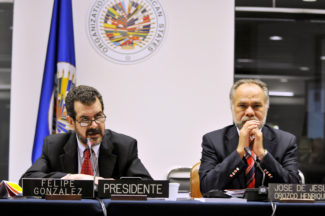Entrenching the Guiding Principles on Business and Human Rights: Can the Inter-American System Help?
By Claret Vargas |
Progressive endorsement (II)
By Rodrigo Uprimny Yepes |
The solid endorsement of the new peace accord by Congress has been a very important step for the beginning of peace implementation.
To say without saying
By Vivian Newman Pont |
Documentaries are a dialogue with reality, both in what they say and show as well as in what they keep silent.
Taxes in the sugar republic
By César Rodríguez-Garavito (Retired in 2019) |
It makes sense that if an idea is criticized by both extremes, it must have something good. What peace could not do, the sugary drinks tax achieved. The tax is being debated in Congress and brought together senators like Iván Duque and Jorge Enrique Robledo, which resist with equal force the measure.
This is how the winter of the new inquisition has arrived
By Mauricio Albarracín |
After ten years of spring for the rights of lesbians, gays, bisexuals, trans and intersex (LGBTI), we have entered the winter of the new inquisition. If something was reborn and consolidated itself during 2016 in Colombia, it was homophobia and transphobia.
The empty land déjà vu: The Constitutional Court can prevent us from going back a decade
By Diana Isabel Güiza Gómez |
"An important proportion of the large concessions of empty land between 1849-1872 was for cinchona bark extraction (...) Among the bark sellers that obtained concessions on empty land, there were people who had significant fortunes, and other that had been State high officials or had links to government. Among them were also investors and foreigners. Other export products had a similar weight such as tobacco, rubber, indigo plans, and coffee (...)"
The false publicity of sodas in Colombia
By Valentina Rozo |
The strategy has associated sugary drinks with a healthy lifestyle, whether it has been through sponsoring sports teams or making them seem "cures" for hangovers.
Toxic Injustice
By Helena Durán |
Toxis are everywhere. They are in pesticides that end up in our food and our water; they are in plastics, electronics, toys, clothes, decorative paints, mattresses and in the chemicals used in gold mining and fracking.
The déjà vu of untitled lands: the Constitutional Court can prevent us from returning a century
By Ana Jimena Bautista, Diana Isabel Güiza Gómez |
"A large proportion of the untitled land concessions between 1849-1872 was for the extraction of cinchona bark (…) Among the merchants of the bark who obtained concessions were persons with significant fortunes, and others who had been high officials of the State or had ties to the government. Among them there were also foreign investors. Other export products such as tobacco, rubber, indigo and coffee had a similar fate (...)

